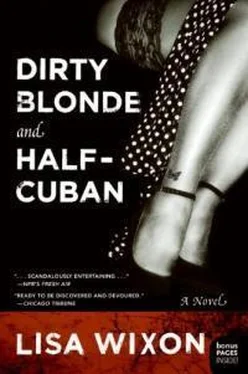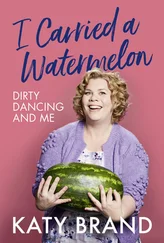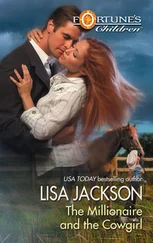Lisa Wixon - Dirty Blonde and Half-Cuban
Здесь есть возможность читать онлайн «Lisa Wixon - Dirty Blonde and Half-Cuban» весь текст электронной книги совершенно бесплатно (целиком полную версию без сокращений). В некоторых случаях можно слушать аудио, скачать через торрент в формате fb2 и присутствует краткое содержание. Жанр: Современная проза, на английском языке. Описание произведения, (предисловие) а так же отзывы посетителей доступны на портале библиотеки ЛибКат.
- Название:Dirty Blonde and Half-Cuban
- Автор:
- Жанр:
- Год:неизвестен
- ISBN:нет данных
- Рейтинг книги:4 / 5. Голосов: 1
-
Избранное:Добавить в избранное
- Отзывы:
-
Ваша оценка:
- 80
- 1
- 2
- 3
- 4
- 5
Dirty Blonde and Half-Cuban: краткое содержание, описание и аннотация
Предлагаем к чтению аннотацию, описание, краткое содержание или предисловие (зависит от того, что написал сам автор книги «Dirty Blonde and Half-Cuban»). Если вы не нашли необходимую информацию о книге — напишите в комментариях, мы постараемся отыскать её.
Dirty Blonde and Half-Cuban — читать онлайн бесплатно полную книгу (весь текст) целиком
Ниже представлен текст книги, разбитый по страницам. Система сохранения места последней прочитанной страницы, позволяет с удобством читать онлайн бесплатно книгу «Dirty Blonde and Half-Cuban», без необходимости каждый раз заново искать на чём Вы остановились. Поставьте закладку, и сможете в любой момент перейти на страницу, на которой закончили чтение.
Интервал:
Закладка:
A CONVERSATION WITH LISA WIXON
This is quite the first novel. Prostitutes, sex, Communism. What on earth inspired you to write a novel using such hot-button themes?
This story found me. I went to Cuba for a week and ended up staying nearly a year. The humiliations Cubans endure—and with such beautiful dignity—is an arresting saga. I felt compelled to write about what I witnessed and experienced. Cuba is full of art, culture, and innocence, but against this backdrop is the tumultuous mix of sex, striving, and Communism.
You introduce the Cuban term for prostitute, jinetera. How is a Cuban jinetera really all that different from an American prostitute, living and working, say, in Las Vegas or New York or Los Angeles, or anywhere else in the American heartland for that matter?
A Cuban jineterawould sock you in the nose for confusing her with a prostitute!
Of course there aretypical prostitutes in Cuba, like everywhere in the world. But in Cuba, the jineterasare not interested in a simple money-for-sex exchange, and they take their cues from the hetaerae of ancient Greece.
The hetaerae were the educated and culturally sophisticated mistresses to wealthy men—the long-term girlfriends who were compensated with property, clothes, and money. The hetaerae generally spoke several languages and were encouraged to entertain with their opinions on art and politics.
The jineterain Cuba is very much like the hetaera, but jineterasclients are international sex tourists. The jineterasin Cuba are generally bright and educated women, and I’m talking practicing doctors, professors, and lawyers. Their daytime jobs cap out at about $32 a month. But a pair of jeans cost $40 and Advil is $10 a bottle, if it’s even available. Without families abroad to support them, many women, and also men, have little choice but to pursue sex tourists, and hope a relationship develops that will pay for the things they need.
We hear all the time in the media how important “moral values” are to Americans. Given the resurgence of this cultural piety, how do you think your novel will be received? Might the dreaded two words be uttered: banned book?
In some ways I do empathize with our cultural piety. I think people are being frightened, and the new conservatism and intolerance is rooted in fear. So what is there to fear about this novel? Perhaps plenty.
My grandmother lived through the Great Depression of the 1930s. The way she tells it, there wasn’t much room for cultural piety. People did what they had to for a scrap of bread, a place to sleep. A hot bath. How could you judge others when your own morals were renegotiated every time you were hungry? One did what one had to do.
Well, the Cubans are now living their Great Depression. If anything, this novel aims at being a testament to the human spirit, and its ability to endure hardships while maintaining a certain level of dignity.
What would you do to survive? We, as Americans, on the whole don’t have to ask this question. Not this generation. But what if things were different? How would we be in extraordinary times? We think we may never be in that position, but what if one day we are?
These are questions we need to ask ourselves.
Sex tourism—your novel is ripe with it. Talk to us. Is this international scene as real as you depict? Do people actually and purposefully travel the world for unadulterated sex? With anyone they wish?
Unfortunately, the scene is very real, and according to agencies that track this kind of thing, sex tourism is on the upswing. Women, too, are joining the ranks of male tourists who shop poor countries for sex partners. And with so many desperate people on the planet, there is all too much supply.
In Cuba, the scene is slightly unusual. First, the government has a schizophrenic policy on allowing its subjects to engage in sex with foreigners. Sometimes there are police crackdowns, and women and men are arrested for cavorting with tourists. Then sometimes the government openly encourages this kind of tourism.
Certainly, not all Cubans are for sale. But if a foreigner propositions a beautiful Cuban woman, she has not only her own comfort and needs to consider, but also that of her family. A week with him can resolve a lot of problems. She’s put in an excruciating position.
What I found most disturbing about sex tourists was this idea of what I call sexual colonialism. Sex tourists believe, whether they admit this or not, that by “conquering” a Cuban, or anyone from a poor country, they are restoring things to their natural order. Cubans are supposed to serve and fawn. Sex tourists of European descent see themselves as entitled, and that the world is theirs to plunder.
The protagonist in your novel is looking for the real father she never met. From film to books, art to music, this search for true parentage seems to be the inspiration of many artists and intellectuals. What do you think is at the heart of this longing? Are we all in some way lost and looking?
At various points in our lives, I believe most of us have felt a sense of longing and that by looking for something or someone, we will find what we need. This idea is not new—it’s a story anthropologists have uncovered from many ancient cultures. In short, it’s a deep human desire, part of our collective unconscious.
I think there are two primal urges behind the looking for our true parentage.
First, there is the deep satisfaction of unconditional love. We may have dear friends, a spouse, children, or adopted parents, but the two people in the whole world who are nearly required by natural law to grant unconditional love are our mother and father.
Second is the notion of atonement. When parents abandon their children, at whatever age, for whatever reason, children always feel the blame of a separation. To reconcile with parents, or to look in the eye of those who’ve abandoned you, to forgive, is a way to heal, and to grow powerful. Look at Telemachus—Homer had him running all over the Mediterranean searching for his father, Odysseus. Telemachus was a different person after he found his father and confronted him. Telemachus, in finding him, became a man.
You traveled to Cuba for your research. What was that like? How different is Cuba really from certain poverty-stricken areas of the United States?
That’s a great question. In the United States, poor people have a very tough time and are without much of a safety net. Crime and violence tend to rack these areas. For those who are impoverished, expenses like health care and higher education are nearly impossible to afford.
In Cuba, the poor people—which is just about everyone—are guaranteed a level of health care, although medicines may not be readily available. Schooling is provided, as are uniforms for children and, for the brightest ones, college and beyond. This is all free of charge. Electricity, when available, costs only a few dollars a year. People live in crowded environs, but only a miniscule few are homeless.
The best thing about living in Cuba, for me—in addition to the extraordinary scenery, music, dance, architecture, and people—was the lack of violent crime. I felt safe walking anywhere, even alone, at any time of night. Although this is now changing as people are becoming more desperate, it’s liberating to feel that level of security, one almost unheard of in Latin American cities, much less our own America.
The novel could easily fall into a diatribe of ideological politics. It does not. You seem to retain a core humanity on every page. Was this difficult to achieve?
You can’t write about modern Cuba without exploring the effect extreme politics has had on the country. But I intentionally avoided using the one-name icons—Che, Fidel, Elián—in the novel. These symbols are so powerful, even a mention can overshadow the story I was trying to tell, the real story of Cuba. That is, the story of the eleven million Cubans and how they’ve been demoralized by the forty-five-year political crossfire between Havana and Miami (via Washington, D.C.).
Читать дальшеИнтервал:
Закладка:
Похожие книги на «Dirty Blonde and Half-Cuban»
Представляем Вашему вниманию похожие книги на «Dirty Blonde and Half-Cuban» списком для выбора. Мы отобрали схожую по названию и смыслу литературу в надежде предоставить читателям больше вариантов отыскать новые, интересные, ещё непрочитанные произведения.
Обсуждение, отзывы о книге «Dirty Blonde and Half-Cuban» и просто собственные мнения читателей. Оставьте ваши комментарии, напишите, что Вы думаете о произведении, его смысле или главных героях. Укажите что конкретно понравилось, а что нет, и почему Вы так считаете.












